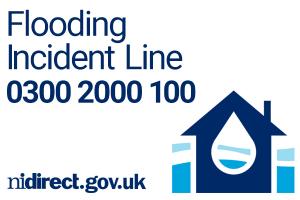Thunderstorms weather warning - advice and information
Date published:

Weather warning
The Met Office has sent out a weather warning for thunderstorms.
It has advice on staying safe in thunder and lightning.
Weather warnings let the public and emergency services know about potentially hazardous conditions.
You can find out more about weather warnings on the Met Office website.
Emergency numbers
You should note the following numbers in case of emergency:
- emergency services – 999 or 112
- Flooding Incident Line – 0300 2000 100
- Northern Ireland Electricity Networks – 03457 643 643
- NI Gas Emergency Service – 0800 002 001
- Northern Ireland Water Waterline – 03457 440 088
- Housing Executive – 03448 920 901
There is information about emergencies at this link:
Flooding Incident Line - 0300 2000 100
The Flooding Incident Line is available 24 hours a day, every day. You can report flooding problems on roads or burst water mains and blocked drains.
When you phone 0300 2000 100, a member of staff will:
- take your details
- contact the appropriate agency on your behalf
This is a non-emergency number, so if you are in danger, call the emergency services on 999.
You can get more information about flooding at the following link:
Power cuts
If adverse weather causes power cuts, you can get the latest information at this link:
If your power is off and you want to report it or get more information, contact:
- NIE Networks Customer Helpline: 03457 643 643
- Report a power cut
Financial help if your house floods
If your home is flooded due to heavy rainfall, contact the local council and ask about their emergency payments scheme.
Report a fallen tree or blocked road
You can report a fallen tree or blocked road at the following link:
Or by phoning 0300 200 7899.
Roads information
If there are any problems on the roads because of flooding, you can get the latest updates on the TrafficwatchNI website.
Public transport
You can find the latest information about bus and rail services on the Translink website.
Local council services
If local council services are affected by bad weather, the latest information should be available on council websites.
Preparing for a flood
To help reduce the impact of flooding on your home, you should:
- have some sandbags, floodboards, or plastic covers prepared to block doorways and airbricks
- know where to turn off your electricity and/ or gas
- move your valuable belongings to safety
- make sure your insurance provides cover against flood damage to property
- keep a list of useful contact numbers such as your local council, emergency services and your insurance company
You can get more details on the preparing for a flood page.
Driving and walking in flooded areas
You should always plan your journey and check the latest weather and travel advice.
Do not travel in heavy rainstorms unless absolutely necessary.
In flooded areas, drivers should:
- not enter flood water that is moving or is more than four inches deep
- not drive through fast-flowing water under any circumstances as the car could be swept away
In more shallow but passable water:
- slow down
- avoid creating bow waves which can damage your car engine
and
- remember to test the brakes after leaving the water
Be aware of hidden dangers under the water, such as missing manhole covers, and guard against the possibility of falling into fast-flowing water.
Do not try to walk through flooded areas. Even shallow water moving fast can sweep you off your feet and there may be hidden dangers, such as:
- open drains
- damaged road surfaces
- submerged debris
or
- deep channels which can result in serious injury or, in the worst cases, death
If you do become stranded in flood water and you feel there is a risk to life, dial 999 for emergency help.
Insurance claims after a flood
If you are going to report flood damage to your insurance company there are certain things to remember. You should keep a record of the flood damage and any contact you have with the insurance company.
If you have different insurers for the structure of your home and your contents, make sure you contact them both.
If you live in rented accommodation, the landlord will deal with the structure of your home. For contents claims, contact your own insurer.
You can find out more at this page:
Preventing health problems
The risk of becoming ill after contact with flood water is generally low. However, as it is not always clear whether flood water is contaminated, you should assume that it is and take appropriate precautions.
There are things you can do to prevent health problems if your home floods:
- wherever possible try to avoid coming into direct contact with flood water
- do not let children play in flood water
- use rubber gloves when cleaning up
- wash hands after being in contact with flood water, sewage or anything contaminated by these
- wash children’s hands regularly
- clean toys that have been in flood water with disinfectant
- cover cuts or open sores
- don’t eat any food that has been in contact with flood water
- clean all surfaces with disinfectant before any food is placed on them
Contact your GP if you, or someone you know, develops a stomach upset following flooding.